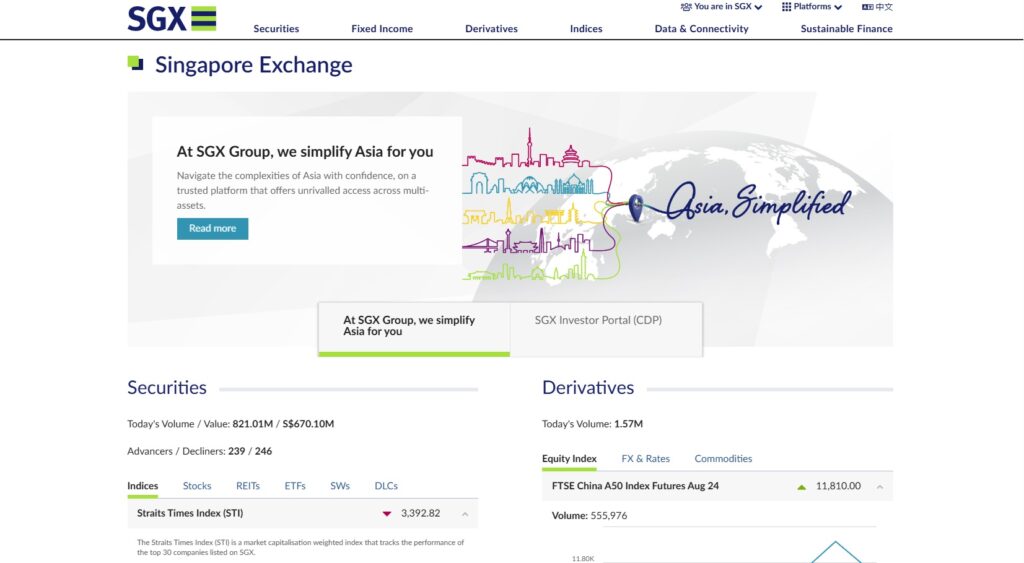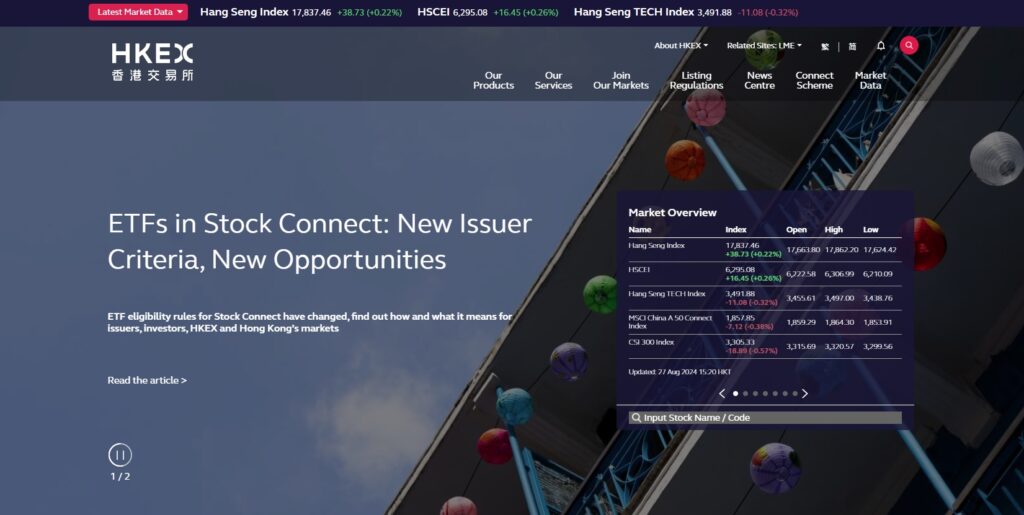Challenges and Opportunities in the Stock Exchanges of Hong Kong and Singapore
Singapore and Hong Kong have long played crucial roles as twin pillars in Asia’s financial markets. However, the roles these two cities play have diverged significantly over time, and in recent years, these differences have become increasingly apparent.
This article delves into the current state, challenges, and future prospects of the Singapore Exchange (SGX) and the Hong Kong Stock Exchange (HKEX).
Strengths and Challenges of the Hong Kong Stock Exchange (HKEX)
Hong Kong possesses a unique international reputation, built over decades as a British colony and now reinforced by its close relationship with China. HKEX continues to serve as a major fundraising platform, especially for Chinese companies. Since the 2008 global financial crisis, numerous Chinese firms have gone public in Hong Kong, allowing investment banks to earn fees with relative ease. This underscores Hong Kong’s robust capital markets and its role as a financial hub across East Asia.
However, in recent years, the market has faced new challenges. The government’s hardline response to the 2019 pro-democracy protests negatively impacted Hong Kong’s international image. Among business travelers and investors, concerns about the city’s future have been growing. While Stephen S. Roach, former chairman of Morgan Stanley Asia, declared that “Hong Kong is over,” emerging markets investor Mark Mobius argued that dismissing Hong Kong’s potential would be a mistake.
Despite these challenges, Hong Kong still boasts a large-scale fundraising market. Yet, the slowdown in China’s economy casts a shadow over Hong Kong’s future. Although Chinese companies continue to utilize the Hong Kong market, the number of IPOs has declined, and the scale of capital raised has shrunk. To maintain sustainable growth, Hong Kong must adopt new strategies and revitalize its market.
Current State and Future of the Singapore Exchange (SGX)

On the other hand, SGX operates in a country whose economy is actually larger than Hong Kong’s, yet the total market capitalization of listed companies on SGX is only about one-seventh that of Hong Kong. This stark contrast highlights the challenges facing SGX.
One of SGX’s major concerns is its low trading volume. In 2023, SGX’s turnover velocity was only 36%, falling significantly behind Hong Kong’s 57.35% and the Japan Exchange Group’s (JPX) 103.6%. As a result, SGX is often labeled “boring” or “lacking in appeal.”
Even companies headquartered in Singapore are increasingly opting for U.S. markets. For example, the online used car marketplace Carro is considering listing on the New York Stock Exchange (NYSE) or NASDAQ instead of SGX. This is largely due to the perception that Singapore’s market may not be able to provide appropriate valuations for tech firms. Carro’s CEO cited the U.S. as a “deeper market,” expressing concerns over SGX’s liquidity and valuation ecosystem.
Nevertheless, SGX is not content with the status quo and is actively pursuing reforms. The Monetary Authority of Singapore (MAS) has established a review group to support SGX’s development and drive reform efforts. One such initiative is the introduction of a framework for Special Purpose Acquisition Companies (SPACs), aiming to stimulate the market by offering new fundraising options. However, the impact of these efforts has so far been limited, and further initiatives are needed to achieve meaningful results.
Differences and Complementarity between Hong Kong and Singapore’s Roles
The stock markets of Hong Kong and Singapore each play distinct roles. Hong Kong has established itself as a primary hub for capital fundraising—particularly for Chinese companies—serving as a venue for IPOs and large-scale financing. In contrast, Singapore demonstrates strength in the private wealth management sector, functioning as a key center for wealth preservation, especially for high-net-worth individuals.
This divergence underscores the complementary relationship between the two markets. For example, many wealthy Chinese individuals follow a strategy of growing their assets in Hong Kong while preserving them in Singapore. The capital-raising opportunities provided by Hong Kong and the stability of Singapore’s wealth management services together form an integral part of financial strategies across the Asia-Pacific region.
Reform and Future Outlook of the Hong Kong Stock Exchange (HKEX)
Recent political and economic shifts have raised concerns about HKEX’s future. Nonetheless, HKEX is advancing strategic reforms to maintain—and even strengthen—its influence.
One key initiative is the expansion of cross-border trading mechanisms such as the “Shanghai-Hong Kong Stock Connect” and the “Shenzhen-Hong Kong Stock Connect”, aimed at deepening economic integration with China. These programs enhance capital mobility between the two markets, promoting their integration and helping increase trading volume in Hong Kong—a move that could attract more investors.
HKEX is also rolling out new initiatives to attract companies in the technology and innovation sectors. These include easing listing requirements and creating new market segments tailored to startups and tech firms. In particular, relaxed listing standards for biotechnology companies are opening up opportunities for firms that previously struggled to go public, thereby broadening the diversity of the Hong Kong market. At the same time, HKEX is working to make the market more attractive to international investors by improving its regulatory environment and enhancing transparency in line with global standards.
In response to growing concerns over Hong Kong’s geopolitical risks, HKEX is reinforcing its risk management strategies to ensure market stability. This includes implementing mechanisms to minimize the impact of political instability on the market and maintaining a trajectory of long-term growth.
Reform and Future Outlook of the Singapore Exchange (SGX)
SGX’s path to reform is not limited to market revitalization—it is part of a broader strategic effort to reinforce Singapore’s status as a global financial hub. The formation of a review group led by the Monetary Authority of Singapore (MAS) represents a significant step toward enhancing SGX’s international competitiveness. In addition, the introduction of a listing framework for Special Purpose Acquisition Companies (SPACs) and other new fundraising options aims to increase the market’s appeal.
However, these reforms alone are not enough. For SGX to become a truly competitive global market, more must be done—especially in attracting technology and high-growth companies. This includes adopting more flexible regulatory frameworks and improving how listed companies are valued.
Furthermore, Singapore should consider offering incentives to encourage international firms to list on its exchange. Leveraging Singapore’s reputation for stability and its strengths in private wealth management, it is essential to build an environment that makes it easier for companies to raise capital.
Summary
The stock markets of Singapore and Hong Kong play distinct yet complementary roles in establishing themselves as leading financial hubs across Asia. However, each market faces its own set of challenges, and the future remains uncertain. While Hong Kong continues to serve as a center for large-scale fundraising, Singapore must harness its strengths in private wealth management and push forward with necessary market reforms.
The reforms and future trajectories of HKEX and SGX will have direct implications for the region’s business landscape, offering new opportunities for capital-raising and corporate growth strategies. In this evolving environment, identifying which market best aligns with a company’s strategic goals will be key to business success.
Feel free to contact us
MAY Planning provides advice on entering and analyzing the Hong Kong and Singapore markets. We also offer support for capital-raising and regulatory compliance across both exchanges.
Reference:
1) Lim Hui Jie「Markets Things about Asia’s markets you might not have known」, CNBC, https://www.cnbc.com/2024/01/09/things-you-might-not-have-known-about-asias-markets-according-to-hsbc.html
2)Tang See Kit「Investments from GIC ‘not the solution’ to shake up Singapore’s stock market: Chee Hong Tat」, CNA, https://www.channelnewsasia.com/business/investments-gic-not-solution-shake-singapore-stock-market-sgx-chee-hong-tat-4451321
3)He Jun「The New Tale of Two Cities: Hong Kong and Singapore under the Age of De-globalization」, Modern Diplomacy, https://moderndiplomacy.eu/2024/06/06/the-new-tale-of-two-cities-hong-kong-and-singapore-under-the-age-of-de-globalization/
4)Lim Hui Jie「Singapore wants to revive its stock market. Could major Asian markets have the answers?」, CNBC, https://www.cnbc.com/2024/06/13/singapore-wants-to-revive-the-sgx-south-korea-japan-may-have-answers.html
5)Shuli Ren「Stop comparing Hong Kong to Singapore」, The Japan Times, https://www.japantimes.co.jp/commentary/2024/06/19/world/comparing-hong-kong-singapore/
6)Nadirah Zaidi、Jalelah Abu Baker「What is stopping firms from listing on SGX and what more can be done?」, CNA, https://www.channelnewsasia.com/singapore/sgx-ipo-valuation-liquidity-nyse-tech-firms-public-listing-4535196



